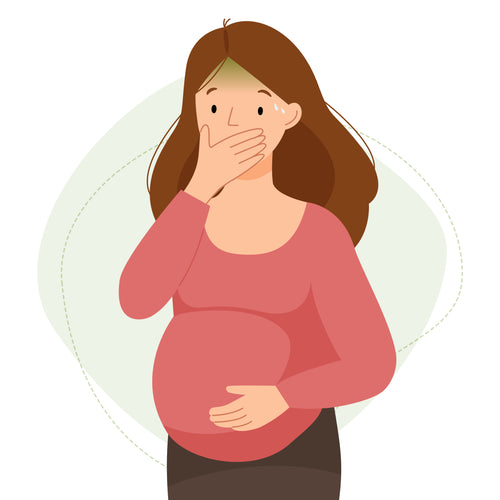If there’s one pregnancy symptom almost everyone has at least heard of – and most of whom have experienced – it’s nausea. Also known as morning sickness, it’s one of those things that a significant number of expectant mums will have to deal with – up to 80%, in fact. While time is usually the only real cure for morning sickness, there are things you can try to help deal with it.
Stay Hydrated
Keeping yourself hydrated is of particular importance, so that’s what we’ll start with. If you’re going through a rough patch and struggling to keep your fluids up, try things like only taking frequent sips rather than whole mouthfuls. Some people find it helpful to suck on ice blocks or chips rather than having a glass of water. Likewise, some find that having icy drinks rather than room-temperature water can make a huge difference. Another way to keep your fluids up is to try having liquid meals such as soups, smoothies or shakes – just try to make them well-balanced and healthy, rather than a sugar-loaded shake. Another traditional remedy for nausea and morning sickness is to have drinks with ginger in them – ginger tea can be a great option!
Eat Small, Frequent Meals
Somewhat counterintuitively, for many people, hunger can actually make pregnancy nausea worse. Just like having frequent sips of water can help, so too can breaking your meals up into smaller, frequent ones instead of having the typical three larger main meals. Many mums find it useful to start the day—before they even get out of bed—with something small, bland and easy to digest, such as a cracker, piece of dry toast, or banana. By eating less, more frequently, you can help keep those sugar levels a little more stable and hopefully prevent nausea – or at least mitigate it somewhat. Having a lot of protein and avoiding fatty foods can have an effect, too. Alongside these recommendations, a number of foods can bring on nausea, though what these are specifically will vary from person to person. Keep an eye on what you’re eating, and if you find your morning sickness is exacerbated by certain foods, try to avoid them.

Get Plenty of Rest
Make sure to get plenty of rest! Pregnancy, especially early on, can be fatiguing, and that fatigue can make morning sickness feel worse. Ensure you’re getting enough sleep, and if you need to rest during the day, try to do so. You may find that you can’t keep up the same level of activity that you had before you were pregnant – that’s quite normal. If you need help with your day-to-day activities, don’t hesitate to ask!
Avoid Triggers
Along with eating specific foods, there may be other triggers that set off your nausea. Smells and odours are a prevalent trigger—you’ve probably heard plenty of stories of pregnant people being unable to cook certain things not due to the taste but because of the smell. Avoid those triggers wherever possible, and if you can’t, try opening windows to let in fresh air or using essential oils in fragrances your stomach can cope with to mask those trigger smells.
Get Exercise
Keeping active often helps. Not necessarily a full gym workout—if all you can manage is a walk around the neighbourhood, then that could potentially do wonders. Keeping active with regular exercise, including gentle activities, is good for general health anyway, and if it helps ease those nauseous feelings, even better!
Toothbrushing
Some people find brushing their teeth first thing in the morning can be another nausea trigger. Many pregnant women find it helpful to eat something small—the dry cracker example mentioned above is a common preference—and then brush their teeth around half an hour later. Giving your stomach a chance to settle after waking can be just what you need.
Honeyeze
Haakaa has recently launched a fantastic new range – Honeyeze. These little lozenges are designed with morning sickness in mind. The Mānuka honey base is incredible for general health, and there are a few different flavours to help you fight that nausea if and when it does occur. The Honey and Ginger version is particularly handy to have nearby as both of these ingredients have an incredibly long history of being used to fight nausea of all types. And because they’re small, chewable lozenges, they’re less likely to end up triggering your morning sickness.
Nausea is challenging to deal with at the best of times, and when you’re in the midst of it, it can sometimes seem like it will never pass. It’s also important to remember that all these tips are for “standard” pregnancy nausea. If you are, or suspect you might be, suffering from hyperemesis gravidarum, it’s incredibly important to make sure this is managed by a medical professional. HG is a much more extreme version of morning sickness and has a real risk of leading to dehydration and malnourishment. Your maternity carer, whether midwife, GP or obstetrician, will know how best to monitor and treat this condition, so make sure you keep them updated on how things are going for you. Luckily, for most, the nausea will subside. For those still in the middle of having to deal with it, make sure to utilise your support system for encouragement – you will get through this!

